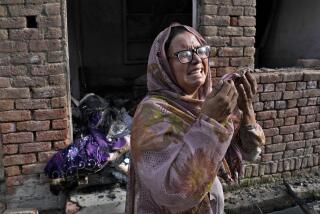Militant Pakistani cleric out on bail remains defiant
- Share via
NEW DELHI AND ISLAMABAD, PAKISTAN — A day after he was set free, a radical Pakistani cleric returned Friday to Islamabad’s Red Mosque, the site of a deadly confrontation with government forces in 2007, and promptly issued an incendiary call for the spread of Islamic law across the troubled nation.
Cleric Maulana Abdul Aziz’s uncompromising rallying call came after a court granted him bail on a string of charges related to the confrontation that left at least 100 people dead when Pakistani troops stormed the hard-line religious complex.
“He’s learned no lessons, nothing’s changed as far as his agenda is concerned,” said Zafar Hilaly, a political analyst and former ambassador. “It’s troubling. His supporters will take a lot of heart, as will extremists, who think they’re on a roll.”
Efforts to prosecute militants often fall short in Pakistan, in part, some analysts say, because of close links between radicals and the nation’s security services.
Taliban and Al Qaeda forces have been emboldened in recent months by the government’s willingness to allow hard-liners to impose Sharia, or Islamic law, in the northwestern Swat Valley region, about 100 miles from Islamabad, the capital.
Thousands of people flocked to the Red Mosque to hear Abdul Aziz lead Friday prayers and deliver his sermon, which he used to fan resistance to Pakistan’s wobbly democracy.
“The day is not far away when Islam will be enforced in the whole of the country,” the cleric told the worshipers in the building as others on the streets outside heard his message over loudspeakers. “I tell you that you should be ready to make sacrifices for Islam.”
Abdul Aziz was arrested in July 2007 as he attempted to flee the compound in a burka, the head-to-toe gown worn by conservative women. His brother, Maulana Abdul Rashid Ghazi, was killed when the 10-day standoff came to a head and troops poured into the complex, which houses a mosque and seminaries for boys and girls. The girls school is run by Abdul Aziz’s wife, Umme Hassan.
The showdown began after students from the complex, who had formed moral police brigades, occupied a children’s library, abducted Chinese health workers, threatened to close down secular music and video shops and detained a woman and her daughter they accused of prostitution.
Abdul Aziz characterized the 2007 standoff as a turning point in the movement’s struggle. “What we have seen in Swat and the tribal areas is the result of the sacrifices at the Red Mosque, the students, the people who were martyred,” he told supporters.
Western analysts and officials worry that the recent agreement to recognize religious law over secular law in Swat, once a tourism attraction, will place more territory outside government control and strengthen the grip of Al Qaeda’s allies.
Some Pakistani analysts caution, however, that lumping all radical elements together risks oversimplifying the situation. They say that Swat has a tradition of locally imposed justice that suited local tastes.
“People sometimes think there are diabolical provisions in the law, which isn’t so,” political analyst Hilaly said. “What is intolerable is that it’s all happening at the barrel of a gun.”
As part of their fight for control, militants in Swat have burned down girls schools, killed police officers, intimidated officials and beaten unmarried men and women seen together in public.
Provincial police chief Malik Naveed told local reporters Friday that the truce was working, and that tourists would soon be flocking back to the valley.
The return of Abdul Aziz to Islamabad after 20 months of house arrest in nearby Rawalpindi appeared to coincide with more prominent displays of hate literature and militant compact discs at stalls in front of the Red Mosque. On his release Thursday, the cleric insisted that his fight for Islamic justice was peaceful. The distribution of videos near the complex, some showing suicide attacks on U.S. forces in Iraq and Afghanistan, came in spite of a government statement Friday that it was working to curb militant media.
--
Zaidi is a special correspondent.
More to Read
Sign up for Essential California
The most important California stories and recommendations in your inbox every morning.
You may occasionally receive promotional content from the Los Angeles Times.










